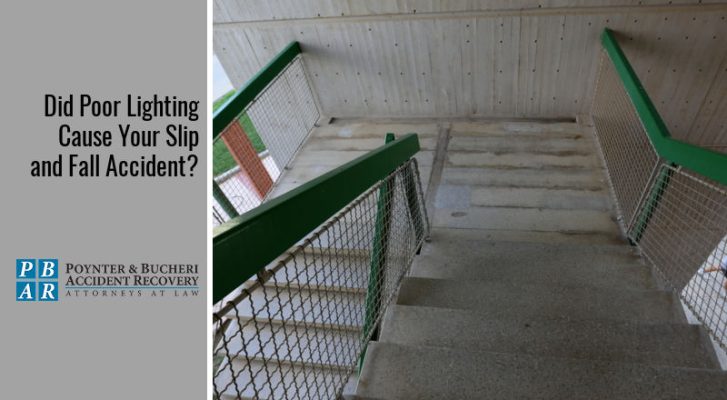
Did Poor Lighting Cause Your Slip and Fall Accident?

Most people are aware of the dangers of motor vehicle accidents, malignant cancer, or purposeful violence. But according to the NSC (National Safety Council), slips and falls are the second leading cause of unintentional injury-related deaths in the United States. Not only are falls one of the top three causes of preventable death, but they are also the top cause of injuries treated in emergency rooms. In 2020, falls were the cause of 33% of all non-fatal emergency room visits.
Many slips and falls are caused by poor lighting, including lighting that is either absent, inadequate, or broken. The lack of illumination can mask other trip and fall hazards, such as wet surfaces, potholes, or uneven floorboards. Poor lighting can also mean that features that would not be normally considered hazardous can catch a person completely unaware. For example, you may not see a curb, not realize that there is one more step at the bottom of a staircase, or not be aware of an object in your path.
It’s human nature to wonder what you did wrong after having a fall, but if you couldn’t see clearly, you had no way of avoiding the trip hazard. The poor lighting caused your slip and fall accident.
If you have suffered injuries as a result of this type of accident, you are probably facing expensive medical bills as well as lost income from missing work. If the fall was caused by poor lighting on someone else’s property, you may have a legal case against the store or owner whose negligence caused the problem. The Indianapolis slip and fall lawyers at Poynter & Bucheri can work with you to fight for fair compensation for your injuries.
Insurance claims or lawsuits of this nature are based on the Indiana Premises Liability Law. This law means that property owners are responsible for deaths, damages, or injuries that occur to people who are legally on their property if the accident happened because of unsafe conditions. As you can imagine, some of those conditions include broken stair rails, wet surfaces in a retail store, or ice in a parking lot. Another condition that falls under this mantle is poor lighting.
To prove negligence, certain conditions must be met (this is the part where your attorney can help):
If you were an invitee on the property (you were there for the benefit of the owner), the owner owes you the highest duty of care. In other words, if you fell because of poor lighting in a supermarket or other business and the owner either knew about the issue or should have known about the issue, he or she is negligent. The owner or manager had a duty to take steps to rectify the situation, block off the area, or warn about insufficient lighting.
These next few tips will give everyone a general sense of what to do if a slip or fall happens because of poor lighting.
- If you can, take photos of the area where you fell. Include light sources, especially any burnt-out bulbs.
- Ask for contact information from any witnesses.
- Report the fall, but make sure not to sign anything that would absolve the store of responsibility.
- Get medical attention. Falls often result in broken bones; 5% of all falls result in fractures.
- Falls are also the most common cause of traumatic brain injuries, according to the CDC. Other common injuries from falls include lacerations, contusions, sprains, torn ligaments, or even spinal injuries. Don’t take any chances.
- Preserve the clothing and shoes you were wearing in case the business claims that you somehow caused the fall because your outfit was unsafe.
- Consult with your attorney before making any recorded statements to an insurance adjuster.
- Follow all medical advice, but don’t sign off on any medical releases without speaking to your attorney.
Two final pieces of advice:
- You may be wondering if you are out of luck if you weren’t paying close attention or were partially to blame for what happened to you. Indiana is a comparative fault state. This means that you may still be able to collect damages if you are less than 51% at fault for your accident. The amount will be reduced proportionately.
- The statute of limitations in Indiana is two years from the date of the fall, so you will want to act as soon as possible.
Indiana’s Premises Liability Law can be complicated, but the attorneys at Poynter & Bucheri, LLC have the experience, skills, and knowledge to navigate your claim and get the compensation you need and deserve. You can read more about it here.
